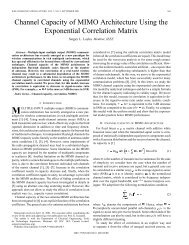A Wordnet from the Ground Up
A Wordnet from the Ground Up - School of Information Technology ...
A Wordnet from the Ground Up - School of Information Technology ...
You also want an ePaper? Increase the reach of your titles
YUMPU automatically turns print PDFs into web optimized ePapers that Google loves.
4.5. Hybrid Combinations 141only (F-score = 0.3268) and measured in relation to manually annotate examples. Ourproblem setting is more difficult (we expect <strong>the</strong> classifier to distinguish e.g. betweenP2 and P3, while Snow et al. included all indirect hypernyms in KH) and we hadmuch fewer learning examples. Also, Snow et al. worked with a hybrid system thatcombined <strong>the</strong> hypernymy classifier with a MSR. It is more related to our WordNetWeaver system presented in <strong>the</strong> next section. Snow et al. had <strong>the</strong> best F-score of0.2714 for <strong>the</strong> classifier-only version.Leaving aside automatic evaluation, one can notice that <strong>the</strong> percentage of falsepositives is still significantly below 50%, which is a ratio that seems acceptable fora tool to support linguists. On <strong>the</strong> o<strong>the</strong>r hand, <strong>the</strong> number of LU pairs presented tolinguists dropped dramatically in comparison to MSR RW F alone, <strong>from</strong> 2300 to 733 –31.87% of <strong>the</strong> initial list. The classifier cannot be used alone as a support tool, butits ability ‘concentrate’ KH pairs in <strong>the</strong> positively classified group will be leveraged in<strong>the</strong> next section for <strong>the</strong> construction of a tool combining different types of evidence inexpanding plWordNet.The results achieved on M for all classifiers were much poorer than <strong>the</strong> results onsets selected <strong>from</strong> plWordNet. We tried SVM as well, hoping for its usually goodperformance on numerical features without discretisation, but in contrast with <strong>the</strong>findings of Kennedy (2006) we have not achieved any valuable result.In Figure 4.7 we present examples of classifier decisions made for elements of setM (classifier C4.5, ratio KH to NK 1:10, E included in NK).A manual inspection of false positives in <strong>the</strong> classification results on set M showsthat many pairs are co-hyponyms. They can be treated as positive answer <strong>from</strong> a linguists’spoint of view, but we tried to train <strong>the</strong> classifier not to select co-hyponyms asrelevant pairs.The results achieved on <strong>the</strong> data extracted <strong>from</strong> plWordNet are very promising,especially when we compare <strong>the</strong>m to <strong>the</strong> results of similar experiments in (Snow et al.,2005), where <strong>the</strong> highest value of F-score was 0.348. A direct comparison, however,is not possible, because we used examples of KH and NH generated directly <strong>from</strong>plWordNet, not <strong>from</strong> sentences in <strong>the</strong> corpora. Randomly generated pairs can includea larger percentage of obviously negative cases. On <strong>the</strong> o<strong>the</strong>r hand, plWordNet is muchsmaller than PWN applied in (Snow et al., 2005), so some NH pairs are in fact relevantpairs not yet added to plWordNet. This introduces substantial noise during training.The results on <strong>the</strong> manually annotated set M, and manually inspected, show that<strong>the</strong> performance of <strong>the</strong> classifiers on real data is lower. They have problems withdistinguishing co-hyponym pairs <strong>from</strong> relevant pairs, and <strong>the</strong>re are more errors for lessobvious cases. Still, if we consider a task of delivering valuable suggestions to <strong>the</strong>linguists, we have achieved an enormous improvement in comparison with <strong>the</strong> lists ofk most semantically related LUs. That is to say, a majority of <strong>the</strong> list elements are



